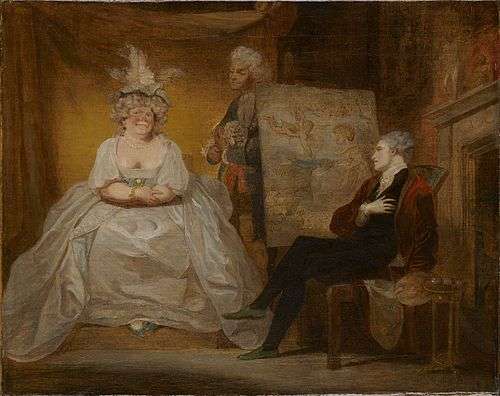1752 in literature
This article contains information about the literary events and publications of 1752.
| |||
|---|---|---|---|
|
Events

Scene from Samuel Foote's satire Taste with the playwright cross-dressed as Lady Pentweazel (painting by Robert Smirke)
- January 4 – The Paper War of 1752–1753 begins with the first issue of The Covent-Garden Journal, where Henry Fielding starts a long quarrel with John Hill by declaring war against hack writers.[1] Tobias Smollett soon becomes involved, accusing Fielding of plagiarism.
- February 29 – Thomas Sheridan introduces at the Smock Alley Theatre in Dublin a version of Shakespeare's Coriolanus that incorporates parts of the version by James Thomson, as Coriolanus, or The Roman Matron.[2]
- September 15 – At Williamsburg, Virginia, Lewis Hallam begins a North American tour with his brother William's company, with a production of Shakespeare's The Merchant of Venice.[3]
- unknown date – The first of the Herculaneum papyri are discovered.[4]
New books
Fiction
- Charlotte Lennox – The Female Quixote[5]
- Voltaire – Histoire du docteur Akakia et du natif de Saint-Malo
Drama
- Samuel Foote – Taste
Poetry
- Moses Browne – The Works and Rest of the Creation
- John Byrom – Enthusiasm
- Richard Owen Cambridge – A Dialogue Between a Member of Parliament and His Servant
- Thomas Cooke – Pythagoras
- William Mason – Elfrida
- Christopher Smart – Poems
Non-fiction
- George Ballard – Memoirs of Several Ladies of Great Britain Who Have Been Celebrated for their Writing or Skill in the Learned Languages, Arts, and Sciences
- George Berkeley – A Miscellany
- Thomas Birch – The Life of John Tillotson
- Francis Blackburne – A Serious Inquiry into the Use and Importance of External Religion
- William Dodd – The Beauties of Shakespeare
- Henry Fielding as "Sir Alexander Drawcansir" – The Covent-Garden Journal (periodical)
- John Hawkesworth – The Adventurer (periodical)
- David Hume – Political Discourses
- William Law
- The Spirit of Love
- The Way to Divine Knowledge
- Henry St. John – Letters on the Study and Use of History
- José Francisco de Isla – Cartas de Juan de la Encina
- Diego de Torres Villarroel – Obra`
Births
- January 3 – Johannes von Müller, Swiss historian (died 1809)
- February 17 – Friedrich Maximilian Klinger, German dramatist and novelist (died 1831)[6]
- June 13 – Fanny Burney, English novelist and diarist (died 1840)
- November 20 – Thomas Chatterton, English poet and forger of medieval poetry (died 1770)
Deaths
- September 19 – Louis Fuzelier, French dramatist (born 1672)
- September 22 – Péter Apor, Hungarian historian writing in Latin (born 1676)
- October 24 – Christian Falster, Danish poet and philologist (born 1690)
- November 2 – Johann Albrecht Bengel, German New Testament commentator (born 1687)
- November 5 – Carl Andreas Duker, German classical scholar (born 1670)
- Unknown date – Li E (厲鶚), Chinese poet (born 1692)
gollark: Not just a CB prize - a *-1G* prize.
gollark: What does the name mean?
gollark: That's a nebula dragon and a half.
gollark: Just trios, metals?
gollark: So... Xenowyrm rarity or what?
See also
References
- Poetical Works p. 443.
- John Ripley (1998). Coriolanus on Stage in England and America, 1609-1994. Fairleigh Dickinson Univ Press. p. 344. ISBN 978-0-8386-3741-8.
- Joshua R. LeHuray (27 May 2016). Virginians Will Dance or Die!: The Importance of Music in Pre-Revolutionary Williamsburg. McFarland. p. 112. ISBN 978-1-4766-6284-8.
- Kenneth Lapatin (16 July 2019). Buried by Vesuvius: The Villa dei Papiri at Herculaneum. Getty Publications. p. 124. ISBN 978-1-60606-592-1.
- Susan Carlile (1 January 2018). Charlotte Lennox: An Independent Mind. University of Toronto Press. p. 90. ISBN 978-1-4426-2623-2.
- Ayres, H.M. (1917). "Friedrich Maximilian von Klinger (1752–1831)". The Reader's Dictionary of Authors. New York: Warner Library Co. Retrieved 24 March 2019.
This article is issued from Wikipedia. The text is licensed under Creative Commons - Attribution - Sharealike. Additional terms may apply for the media files.